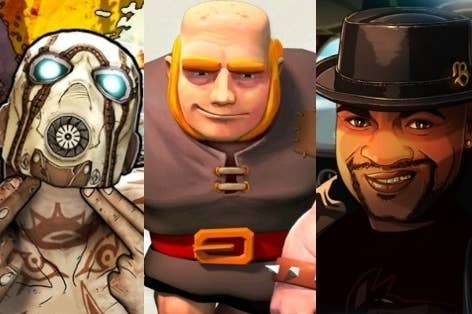12 Games That Defined 2012
The titles that represented the growth, success and future of the games business this year
Has it been a hard year for the games industry? Every year has been hard for the games industry. If it wasn't hard the industry wouldn't be going through such a terrible and terrific rate of change. But while the old studios fell, publishers crumbled and retail clawed along the gutter, the successes were just as prominent. The industry is pumping with fresh blood, new talent, bright ideas, secure business models, alternative retail channels and a willingness to adapt, grow and learn. And above all it continues to deliver games that are the envy of the entertainment world. Here then, are some of the titles that stood out as the biggest, brightest examples of success in the video game industry in 2012.
Journey
Sony is broke. Absolutely broke. What it can't afford to do is help make trippy indie adventures when it should be making money. That shit doesn't sell, it's just a PR exercise to make a company look like it's willing to experiment and try new ideas in a business where risk is rewarded with redundancy.
"Journey is a glorious piece of art as entertainment and a banker for Sony during a year it needed to scrape together every single penny"
Apart from it does sell. And who knew it would sell so well, with Journey becoming the biggest ever success on PSN? So it's a double win - a glorious piece of art as entertainment and a banker for Sony during a year it needed to scrape together every single penny it could find. Quick, port it to Vita! No seriously, port it to Vita. The sad thing for games players and Sony is we won't see its like again, with Thatgamecompany taking over $5 million in funding and Hunicke, Santiago and friends buggering off elsewhere. Journey: critical darling, commercial success. On the PlayStation 3, no less.
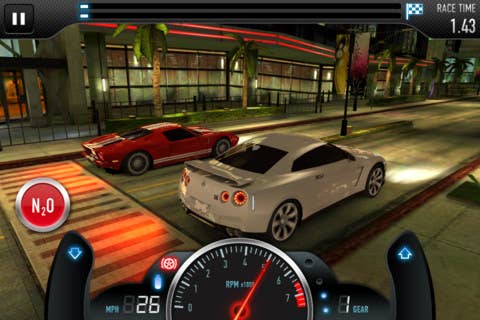
CSR Racing
Boss Alien came straight out of Black Rock redundancy focused on the prize - the cliché of bringing triple-A sensibilities to mobile gaming. From most developers that sounds like arrogance on their part and a snub to all those great mobile developers already out there, but Boss Alien delivered not only a wickedly strong game, they showed they understood the ruthless nature of squeezing money out of the player. Games aren't free to make and the player doesn't get a free ride. Pay for gas, pay for cars, even pay to speed up something you've paid for. Just make sure you pay otherwise these games don't get made again and we're back to cloned match-three games and word puzzles. God knows, we've had enough of those.
Publisher Natural Motion was already a success, but street racing gives them so much more credibility than horses, no matter how many virtual saddles you sell. They bank-rolled the project and then bought up the studio as a thank you to those involved and a f**k you to anyone else who saw a potential talent acquisition. That's a UK developer and a UK publisher success story right there. Break out the bunting and have a celebratory cucumber sandwich.
Borderlands 2
Borderlands 2 gave Gearbox that mega hit it's been striving for and so rightly deserves, the title the studio can build a solid future on. Borderlands is Gearbox's Halo. At a time when so many big development studios live or die by their last release, Randy Pitchford's gang of reprobates are some of the coolest, baddass and erm, financially secure development teams in the console space.
"Take Two is a company that understands you start making lots of money by finding and backing an original creative vision"
It's also another big franchise for Take-Two. Rockstar who? Borderlands 2 blew Max Payne 3 right out the water. Investors have been worrying for years that Take-Two is just the Grand Theft Auto company, but Borderlands must now surely convince the suits at the stock market that like Ubisoft, this is a company that understands you start making lots of money by finding and backing the original creative vision first of all.
World of Tanks
You know where's hot for game development right now? The Republic of Belarus. Specifically, one company and one game that's helped it grow from 120 people (not too shabby to begin with) to more than 1,200 people globally. While execs were watching and worrying over The Old Republic, The Secret World and that one with wizards and pandas in it, Victor Kislyi and his hard working team built the new poster boy for the free-to-play, the MMO and the PC gaming businesses. 40 million registered players can't be wrong. They love Counter-Strike with tanks.
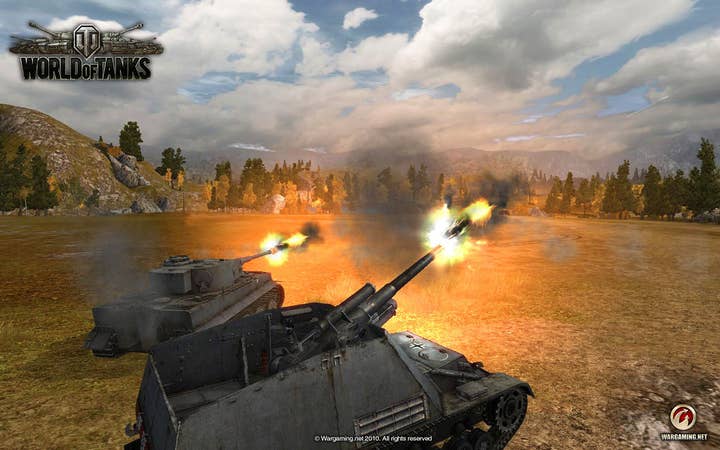
Kislyi openly admits he's following Battle.net's lead with Wargaming as a full service, but hopes to improve on that by adding multiple games - World of Tanks, World of Warplanes and World of Warships. There's nothing small about the ambition - the games are intended to last for ten years or more - but the company remains humble. This is a CEO that sits down to drink beer with his players on a regular basis and gather feedback. How many execs do you know who are willing to get that close to the people who ultimately pay the wages? Next year it looks like the round's on Victor. Again.
Minecraft XBLA
Minecraft is just like Angry Birds. It's been ported to multiple formats, you can buy toys based on its characters (well, a pick axe) and it's made a shit-tonne of money. In the context of video game development it's a cheaply produced game that's gone on to conquer the world. It's one of the shining stars of the new games world. Mario and Sonic are old farts compared to these guys.
Just when you thought Minecraft was really, truly a PC phenomenon it turns up on Xbox Live - that notoriously indie unfriendly place - and conquers it. Minecraft isn't about many things, graphics being one of them, but it is about giving people a toy box to do what the hell they like with. And it turns out you can be just as playful with a controller than a mouse and keyboard. 4J Studios has done a fantastic job keeping Minecraft feeling fresh and close to Notch's original vision. This isn't a console spin off that was expected to nudge the sales numbers up a little; with 4.5 million copies sold on Xbox Live it's doing a grand job of racing after 5 million downloads of the mobile version and the PC's 8 million units. You can bet the success of Minecraft on XBLA is having a massive influence on Microsoft's digital strategy for its next Xbox.
Clash of Clans
Gunshine didn't work for Supercell, so it moved on. Clash of Clans (alongside Hay Day) has been its big hit, pulling in over $500,000 per day for the Finnish company. The empire-buiding strategy game is at home on iOS and loved by millions. When you Google a game and see lists of cheat sites, hacks, wiki, social and forums pop up you know this is a title with its own community.
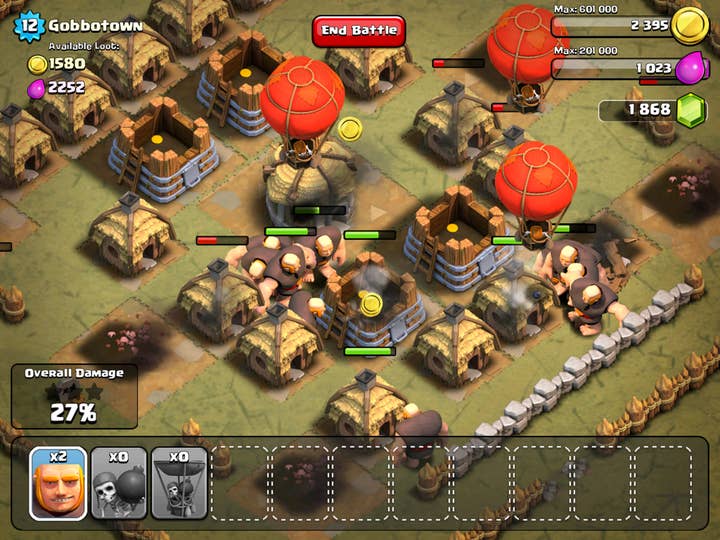
Clash of Clans is still hovering around the high end of the Top Grossing charts and taking advantage of that virtuous circle, where casual browsers see the slick icon, the glowing customer reviews and the damn good-looking screenshots and plunge in. It's free to get started, so there's nothing to lose. Clash of Clans demonstrates that you don't need traditional consumer games press. No score out of ten matter, and by the time the press have noticed it the game is already a very big hit indeed.
Curiosity
Are people still chipping away at that cube? Christ almighty! Is it a game? Who cares. It's an experiment, it's a talking point, it was a shambles at launch, it's pointless and it's addictive. What Peter Molyneux and the 22 Cans guys have done is create an event. Define it however you like. Try and win the prize in the middle. Slag it off and delete it from your iPad. Would this have gotten the press coverage it did if it wasn't one of Molyneux's harebrained schemes? No, but that's not an unfair advantage. It's just an advantage. Many studios would kill for that kind of upper hand.
"Would Curiosity have gotten the press coverage it did if it wasn't one of Molyneux's harebrained schemes? No, but that's not an unfair advantage"
What Curiosity has done hasn't been repeated with 22 Cans' other project, new god game Godus. The Kickstarter for that project is stalling, and that's something the team should be encouraged by. Don't make something expected of you, make something completely off the wall. There are only a handful of companies that can make that choice and take that chance, and thankfully 22 Cans is one of them. Good luck in the future guys, you're going to need it.
League of Legends
E-sports. While many in the games business are just getting their heads around the potential of competitive games playing, Riot Games has been making millions off fans fighting each other online with more than 8 million people watching. There are 3 million concurrent players in League of Legends. It'll never catch on you said. Tencent saw the potential when it started working with them over four years ago.
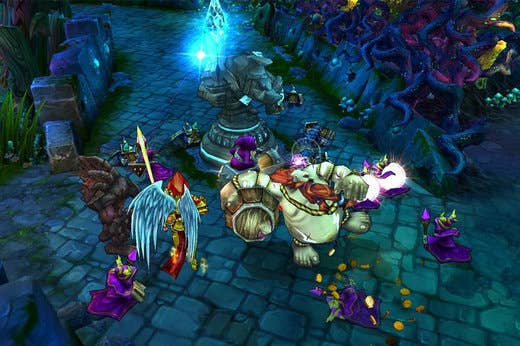
Riot still loses money on actual e-sports tournaments but that doesn't stop them because it believes playing games competitively can be a day job. 40 players got a year's salary of $30,000 on top of whatever prize money they take home this year. That's not a bad start.
There are big challenges ahead - making the game more approachable for new players and calming down the insular, aggressive online attitudes of its players should be top of that priority. But as League of Legends grows and new avenues like merchandising open up, it's reassuring to know that Riot is one of those companies pushing very hard to establish a business that could benefit so many other companies in the long term.
Halo 4
Halo 4 was the big hit reinvented. Bungie stepped away from Halo what seems like ages ago, and 343 Industries stepped up to take Microsoft's iconic franchise on. Big boots to fill, but something Frank O'Connor and his team knew they could do. Now it's a matter of public record. The critics loved Halo 4. So did the fans. 343's approach to creating the next in the series was interesting too - the online voices didn't matter so much as the 9 million other Halo players who don't care who makes the game: they just want the best Halo experience they can get. Fan feedback's great, but don't base your entire development on it.
So as the Xbox 360 begins to bow out of this generation, it still has games like Halo 4 showcasing all that can be achieved on an ageing console. And it kind of makes us wonder, with such talent on display and a blooming install base, do we really need the Durango release in November?
"DeNA liked Rage of Bahamut so much it acquired a 20 per cent stake in Cy Games for over $90 million"
Rage of Bahamut
I'm still a bit baffled by Rage of Bahamut but I'm not afraid to admit it. I would image there's many out there who feel the same. It doesn't matter; Cy Games' card battling RPG came out of the blue for many of us but it proved itself to be a sensation on Android and iOS across Korea, Japan, Europe and the US. Publisher DeNA liked it so much it acquired a 20 per cent stake in Cy Games for over $90 million. Keep an eye on it going the whole hog and buying up the other 80 per cent in the near future.
Rage of Bahamut has been key to establishing DeNA's Mobage platform in the US, as it tries to replicate the mobile success it's received in Japan. The game is partly responsible for the publisher expecting to turn a profit for the first time in foreign markets. And once it moves into the black, then it can begin looking seriously at mergers and acquisitions with Western companies.
FIFA 13
The visual fidelity of FIFA in the mid-Nineties was enough to make my father frequently enquire about which match I was watching on television. At that point, his confusion seemed less absurd than it clearly was: from a distance, with a minimum of proper attention, FIFA 95 seemed to be real football. In 2012, with the launch of FIFA 13, EA Sports came closer than any other developer to realising that ideal.
And not just in the visual or physical sense, though FIFA 13 is certainly marvellous in both of these areas. The real strength of this year's iteration is the way it harnesses the widespread passion that already exists for the world's most adored sport, and builds it into the game's mechanics: every player nominates a favourite team when they first start, with all of their results then feeding into a meta-table collated from the entire FIFA community; weekly challenges are set by the FIFA team, based on actual situations and results from football leagues all over the world; news stories from the sport are fed into the game and discussed by the in-game commentators.
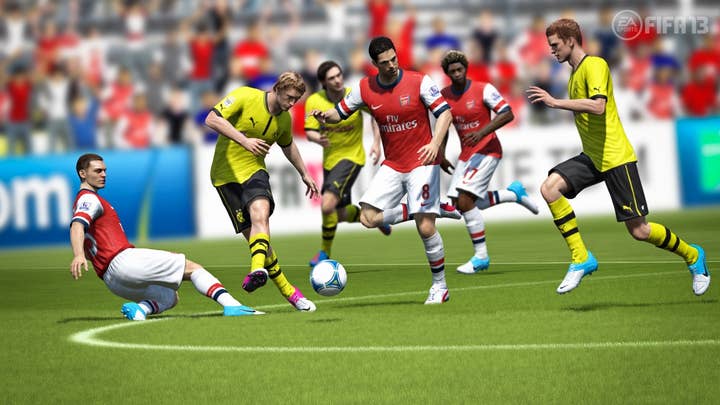
FIFA 13 is a game that grows and changes every single day. It is the embodiment of Andrew Wilson's view of AAA games as persistent experiences, and a redefinition of what we mean by 'fan service'. It is also one of the most generous packages of content in the industry. A player could glean £40 worth of value from the single-player modes alone, but then there is online play, skill games, EA Sports Football Club, Ultimate Team, and more besides. Many of game's features were seeded in previous iterations, but this is the year it really came together. FIFA 13 set a new template for the series, and for sports games in general.
Bubble Witch Saga
So it turns out you don't have to be Zynga to reap the rewards of Facebook players. But King.com isn't just hanging around on the social network, it's making the move to mobile that so many Facebook publishers are struggling with.
Now available on Android as well as iOS, Bubble Witch Saga was one of the first titles to sync player stats and purchases across formats. So any stats, game progress and virtual goods are available on mobile and Facebook allowing for the carry-on-playing-where-you-left-off dream to edge that little bit closer. It's a small step in 2012, but it's hopefully going to become a massive feature for upcoming games across social and mobile networks in the coming months and years.
